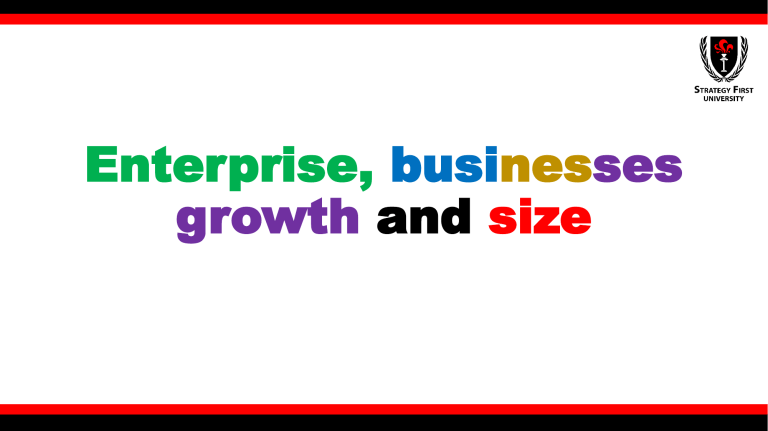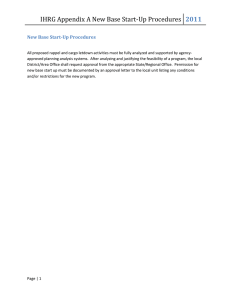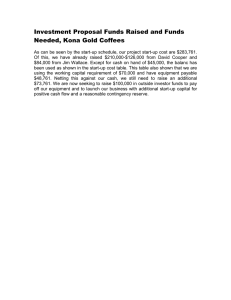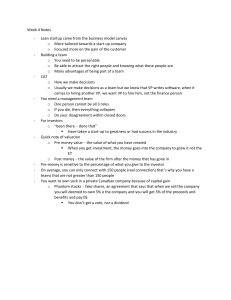Business Growth & Start-ups: Government Support & Size Metrics
advertisement

Enterprise, businesses growth and size Why and how governments support business start-ups • Small business are important to most economies throughout the world. In UK for example, in 2012 • 4.8 million businesses • More than 99% of these businesses were small ore medium-sized businesses, employing fewer than 250 people • 4.6 million micro-businesses(96% of all businesses), employing fewer than ten people Governments are keen to encourage new start-up business because of the benefits they bring to the economy. These benefits include Job creation • Small firms may not individually employ many workers • Employ a very large percentage of the working population • Entrepreneurs – who start up new businesses bring ideas for goods and services • Increase variety of products available • To create a greater consumer choice in the market • • The more businesses there are in the marketplace, the greater the competition Competition usually results in lower prices and better quality of goods and services • Small businesses: provide specialist goods and services to consumers which larger businesses are less interested in supplying because they are only interested in mass marketing • provide goods and services needed by the larger firms in the industry, for example a small firms that produces electronic components used by large computer manufacturers Start-up businesses: begin life as a small business, but some will grow and become the larger businesses of the future Country: benefit from the advantages larger businesses bring to the economy Some start-up and smaller businesses often have much lower costs than larger businesses and can pass this on to the consumer through lower prices Government: provide financial and other support new business start-ups Most common types of government support include: • Grants and interest-free or low-interest loans • Lower taxation rates on profits in the early years • Rent-free premises for a certain period of time • Free or subsidised training schemes for employees • Information, advice and support from specialist agencies Key Term • Business start up: a newly formed business. They usually start small, but some might grow to become much bigger Measuring business size •Capital employed •Value of output •Number of employees •Market share Capital employed • Value of all long-term finance invested in a business • Used to buy the things that a business needs before it can produce goods and services • For example: factory/office buildings, machinery and inventory-these are known as assets • Small business will invest less capital than a large business in the same industry- for example, a small baker will only need one shop, one food mixer one oven and a small inventory of raw materials • A large bread manufacturer will need production lines, industrial mixers, large ovens and a large inventory of raw materials Value of output • The amount businesses earn from selling their products is often used to compare the size of businesses in the same industry • A small business will have much lower revenueearnings from sales-than a larger business For example: a small general store will have fewer customers than a large supermarket and therefore, much lower sales and revenue. The larger the market a business serves, the more revenue the business is likely to earn Number of employees • Large businesses need to produce a much greater output or provide their services to a much larger market than smaller businesses. They will also have more departments and managers • Larger businesses usually employ many more employees than smaller businesses in the same industry, for example a local general store and a large national supermarket Market share The larger the share of the total market, the larger the business Market Share% Firm A Firm B Firm C 10 60 6 500 500 850 Firm B is larger than Firm A because its market share is six times bigger However , can we describe Firm B as a large business? The answer is yes if we use market share as a measure. However, does this mean that Firm C with a market share of just 6% is a small business? The answer lies not in the market share of each business, but in the value of each firm’s share of the market: So, if we work out Firm B’s share of the market: 60% of 500000= $300000 And Firm C’s share of the market: 6% of $850000= $ 510000 We can see that the value of Firm C’s market share is much higher than the value of Firm B’s market share. Therefore, Firm C is larger than Firm B End





